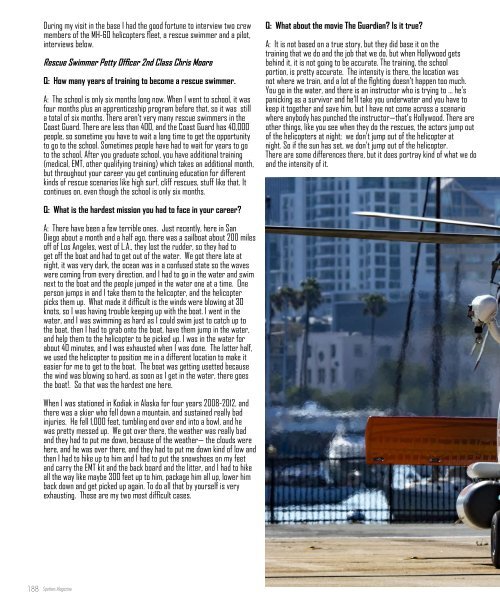You also want an ePaper? Increase the reach of your titles
YUMPU automatically turns print PDFs into web optimized ePapers that Google loves.
During my visit in the base I had the good fortune to interview two crew<br />
members of the MH-60 helicopters fleet, a rescue swimmer and a pilot,<br />
interviews below.<br />
Rescue Swimmer Petty Officer 2nd Class Chris Moore<br />
Q: How many years of training to become a rescue swimmer.<br />
A: The school is only six months long now. When I went to school, it was<br />
four months plus an apprenticeship program before that, so it was still<br />
a total of six months. There aren’t very many rescue swimmers in the<br />
Coast Guard. There are less than 400, and the Coast Guard has 40,000<br />
people, so sometime you have to wait a long time to get the opportunity<br />
to go to the school. Sometimes people have had to wait for years to go<br />
to the school. After you graduate school, you have additional training<br />
(medical, EMT, other qualifying training) which takes an additional month,<br />
but throughout your career you get continuing education for different<br />
kinds of rescue scenarios like high surf, cliff rescues, stuff like that. It<br />
continues on, even though the school is only six months.<br />
Q: What about the movie The Guardian? Is it true?<br />
A: It is not based on a true story, but they did base it on the<br />
training that we do and the job that we do, but when Hollywood gets<br />
behind it, it is not going to be accurate. The training, the school<br />
portion, is pretty accurate. The intensity is there, the location was<br />
not where we train, and a lot of the fighting doesn’t happen too much.<br />
You go in the water, and there is an instructor who is trying to … he’s<br />
panicking as a survivor and he’ll take you underwater and you have to<br />
keep it together and save him, but I have not come across a scenario<br />
where anybody has punched the instructor—that’s Hollywood. There are<br />
other things, like you see when they do the rescues, the actors jump out<br />
of the helicopters at night; we don’t jump out of the helicopter at<br />
night. So if the sun has set, we don’t jump out of the helicopter.<br />
There are some differences there, but it does portray kind of what we do<br />
and the intensity of it.<br />
Q: What is the hardest mission you had to face in your career?<br />
A: There have been a few terrible ones. Just recently, here in San<br />
Diego about a month and a half ago, there was a sailboat about 200 miles<br />
off of Los Angeles, west of L.A., they lost the rudder, so they had to<br />
get off the boat and had to get out of the water. We got there late at<br />
night, it was very dark, the ocean was in a confused state so the waves<br />
were coming from every direction, and I had to go in the water and swim<br />
next to the boat and the people jumped in the water one at a time. One<br />
person jumps in and I take them to the helicopter, and the helicopter<br />
picks them up. What made it difficult is the winds were blowing at 30<br />
knots, so I was having trouble keeping up with the boat. I went in the<br />
water, and I was swimming as hard as I could swim just to catch up to<br />
the boat, then I had to grab onto the boat, have them jump in the water,<br />
and help them to the helicopter to be picked up. I was in the water for<br />
about 40 minutes, and I was exhausted when I was done. The latter half,<br />
we used the helicopter to position me in a different location to make it<br />
easier for me to get to the boat. The boat was getting usetted because<br />
the wind was blowing so hard, as soon as I get in the water, there goes<br />
the boat!. So that was the hardest one here.<br />
When I was stationed in Kodiak in Alaska for four years 2008-2012, and<br />
there was a skier who fell down a mountain, and sustained really bad<br />
injuries. He fell 1,000 feet, tumbling end over end into a bowl, and he<br />
was pretty messed up. We got over there, the weather was really bad<br />
and they had to put me down, because of the weather— the clouds were<br />
here, and he was over there, and they had to put me down kind of low and<br />
then I had to hike up to him and I had to put the snowshoes on my feet<br />
and carry the EMT kit and the back board and the litter, and I had to hike<br />
all the way like maybe 300 feet up to him, package him all up, lower him<br />
back down and get picked up again. To do all that by yourself is very<br />
exhausting. Those are my two most difficult cases.<br />
188 <strong>Spotters</strong> <strong>Magazine</strong>




